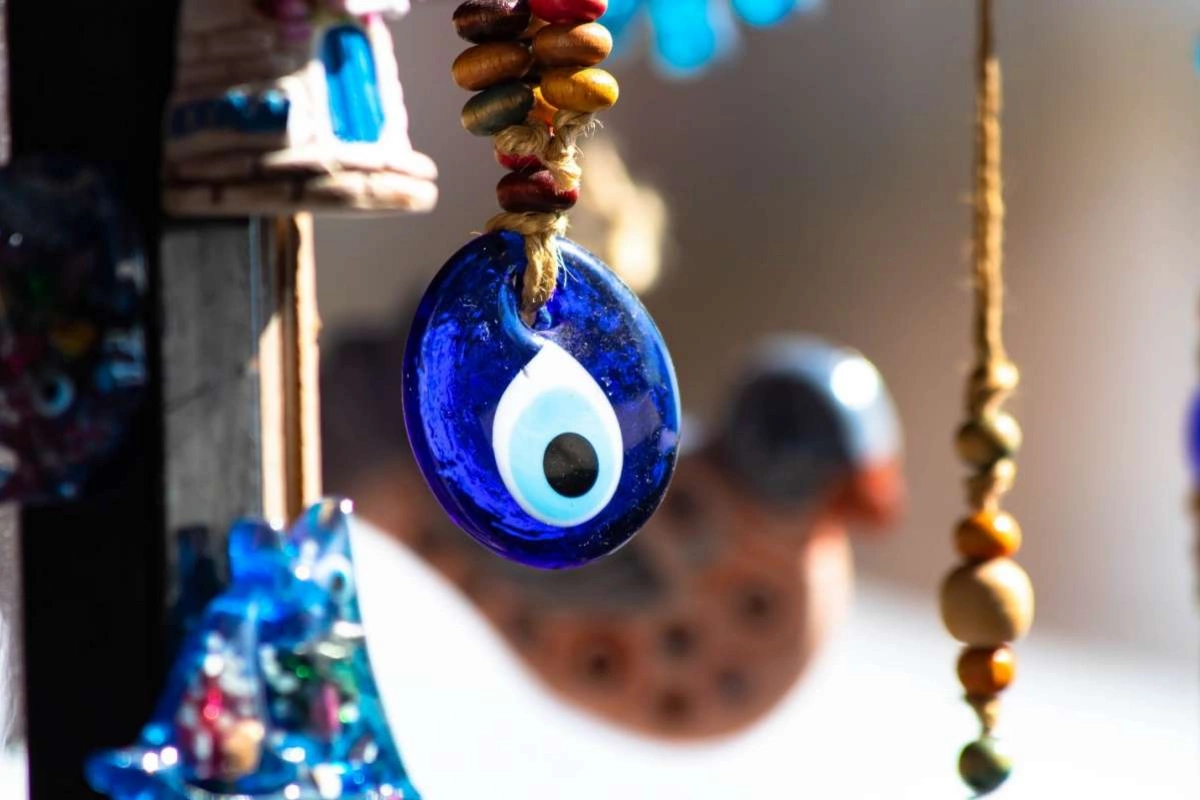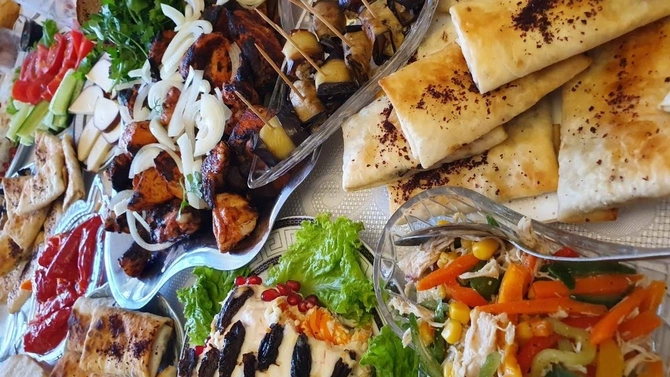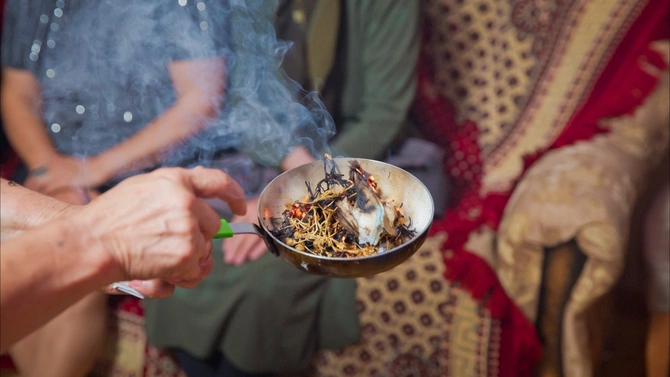
|
There’s more to these blue glass trinkets than meets the eye. Image: Sener Dagasan/Shutterstock
Today I want to discuss a very peculiar cultural aspect of my home country, Azerbaijan. Even if it is, as we would say back home, an untranslatable element of national folklore.
You might have never heard of the evil eye. Yet, in many countries it is a superstition that plays an important role in the culture of the people. If you visit Turkiye, you will find blue round glass souvenirs resembling eyes absolutely everywhere. You can purchase one in any size, from a small earring to a large plate to hang on a wall. This blue souvenir is meant to repel the evil eye, which is basically someone’s jealousy of your fortune, which could result (according to this superstition) in your luck turning bad.
Just like our Turkish cousins, Azerbaijanis also worry about people getting jealous and jinxing our luck, should things go well for us.
There is, however, one big “but.” The problem here is that we Azerbaijanis also quite like to show off. And the more one shows off, the more one is perceived to encourage the evil eye.
Thus, our almost genetically programmed desire to show off is locked in a constant battle with our superstitious fear of others getting too jealous and “evil-eyeing” our luck.
Some people live their lives tormented by the tension. They need to decide how to announce the engagement of their offspring, for example, without people getting jealous and spoiling the future union. Or how to tell friends that they got a new job. I had an old friend from university, who now lives abroad, who waited six months after she had had a child before telling me about her pregnancy. I had had no idea she was expecting. Quite why I would be jealous of her fertility when I have kids of my own is something I could not understand. But I guess that’s just an example of how far this irrational fear can expand.
In the modern world, with social media and platforms like Facebook and Instagram encouraging self-promotion, this torment reaches a different level altogether. You want to post a photo from an expensive restaurant you have just been to, yet what will you do about the hundreds of people who might see that, feel jealous and “evil eye” you from miles away? It is not easy to ward off their jealousy across the internet.
When I speak of our cultural need to show off, I am talking about this genetic trait of needing to appear better off than we really are. This can be seen in how we treat things like food or money and the lengths we go to to be generous and extravagant in situations where western cultures would prefer to save their cash.
Let’s consider two of those.
Food in Azerbaijan is full of symbolism. Anyone who has ever been invited to an Azerbaijani house for dinner would find the spread overwhelming and humanly impossible to consume in one go. When I moved to the UK, I found catering for visitors to be one of the most noticeable cultural differences. Whenever Brits invited me to dinner, they prepared food pretty accurately for the number of guests expected. Perhaps it was only at this point it started to dawn on me that, back home, we cater for at least twenty extra imagined people. At an Azerbaijani wedding, things are even more lavish, a sea of dishes constantly replacing one another. Our biggest fear as hosts is that we might run out of food before our visitors had a chance to explode. What if people think of us as stingy or poor?

This is just one corner of the table at a typical Azerbaijani feast. Image: Stephanie Lazerte/Caspian Post
People would rather starve for a month after a wedding or party than not have enough to feed their guests at the table. There’s no doubt that there’s an element of showing off, but it is also mixed well with generosity, sprinkled with lots of salt.
A very well-off British mother asked me once what I was feeding my young child for breakfast. I told her that I used special ‘baby porridge.’
“Oh,” she said, “we don’t use that one anymore. It’s so much more expensive than regular porridge!” I found that amazing. How much more expensive can baby porridge be, I wondered? 60p? 63p? And why would anyone announce that they were trying to save money like that? No, I realized: I will never be rich. And I will die Azerbaijani. Some things will never change, however long I live abroad.
Azerbaijanis positively take pride in being wasteful with money.
I remember an old Soviet joke from my childhood that explains the level of silliness an Azerbaijani person would go to prove that they are quite sorted in this life[1].
An Azerbaijani guy is out for the night with his Armenian and Georgian friends. So, they go to a bar and have a few drinks first.
The Armenian says – I will get this. When offered the change, he waves it away dismissively - No, no, please keep it.
They then continue to dinner. At the end of the meal, the Georgian guy says: I will get this. He pays for the three of them and leaves a ridiculously generous tip.
The Azerbaijani is watching nervously. They then decide to go to a Gentlemen’s club. As they are ready to go home, the Armenian and the Georgian pick up their coats from the cloakroom. The Azerbaijani gives the attendant his ticket and waves generously – “No, no. Keep the coat!”
The bottom line here is that most of us Azerbaijanis may act, as my husband would say, like Abramovich. This does not usually mean we are rich. It just means most of us have a desire to appear richer than we are.
So, as you can see, worrying about the evil eye at the same time as having the desire to appear well off and generous can result in a complicated situation. I will let you in on a secret, though.
We Azerbaijanis have several ‘magical’ traditions to keep the evil eye at bay.
First, we hang those “evil eye” talisman souvenirs everywhere. Ideally, there’ll be one near the front door, so visitors see it before they even get a chance to jinx our luck. We also hang them in cars, wear them around our necks and pin them to a baby’s pram.
In case the blue glass charms fail to protect us for some reason, there are additional measures one can take.
One is to burn dried sprigs of a plant that we call uzerlik (peganum harmala), creating billows of smoke with a reassuringly acrid pong.

After spending some time in Azerbaijan, the scent of burning uzerlik, (peganum harmala) becomes as recognizable as cut grass. Image: Adil Celebiyev StokPhoto/Shutterstock
Another is to take a pinch of salt and circle it around the head of the person you are trying to protect from evil eye envy. You can use ordinary table salt, rock salt or sea salt crystals – any are suitable. However, after the procedure, the salt should be thrown into a fire. This method worked well in traditional old-style Azerbaijani homes that had gas stoves. As we threw in the salt, the flames would flicker with impressive extra vigour, to which my grandma would exclaim: “See how much evil eye we just got rid of??” This approach doesn’t really work with electric stoves: it just creates a lot of mess. I tried!!
We also have a twist on the Western ‘knock-on wood’/’touch wood’ superstition, which involves an extra element: a scratch of the bum. This has more of a niche usage. For example, it could be used when you look at your child and say, “you look so cute today!” If you don’t want to invoke potential bad luck, then that sort of comment must usually be accompanied by scratching the cherub’s bottom and tapping on anything wooden.
Finally, we have a special mantra to recite when we believe someone is envious of something we own, whether a new car or an engagement ring. Under our breath, we’ll whisper: 'Senin gozun menim gotume!' which translates “may your evil eye go up my arse.” Presumably, a backside is a safe place to store any evil eye that might be fired at us.
So, there you go. You don’t have to be superstitious to become a creature of mystical habit. I scratch my poor children’s bottoms pretty often, and I don’t even believe in the evil eye. At least that’s what I tell myself.
[1] It’s exaggerated, of course, and you’ll notice that the joke pre-dates recent conflicts as it mentions Armenians and Azerbaijanis being friendly. I’d like to think that this is still possible, and that it will become more common someday soon.
Share on social media